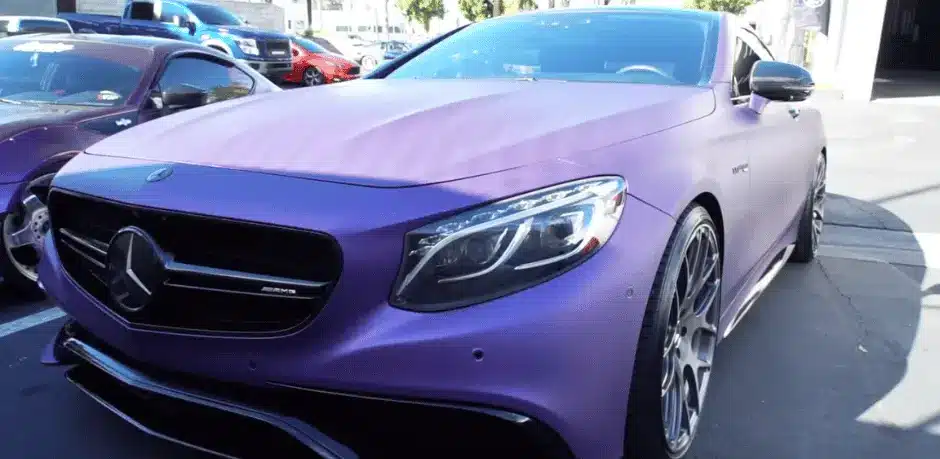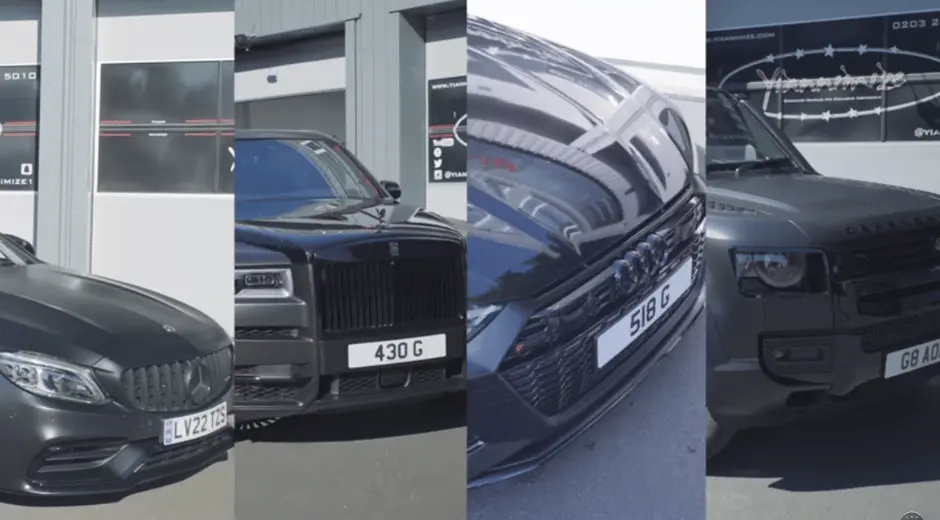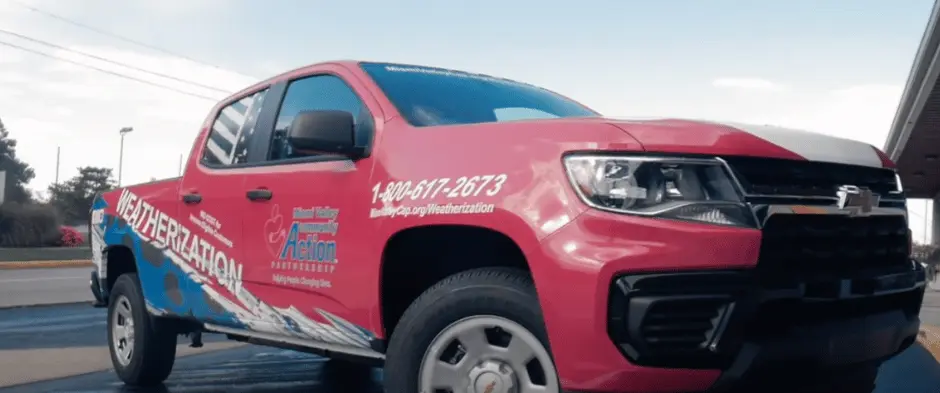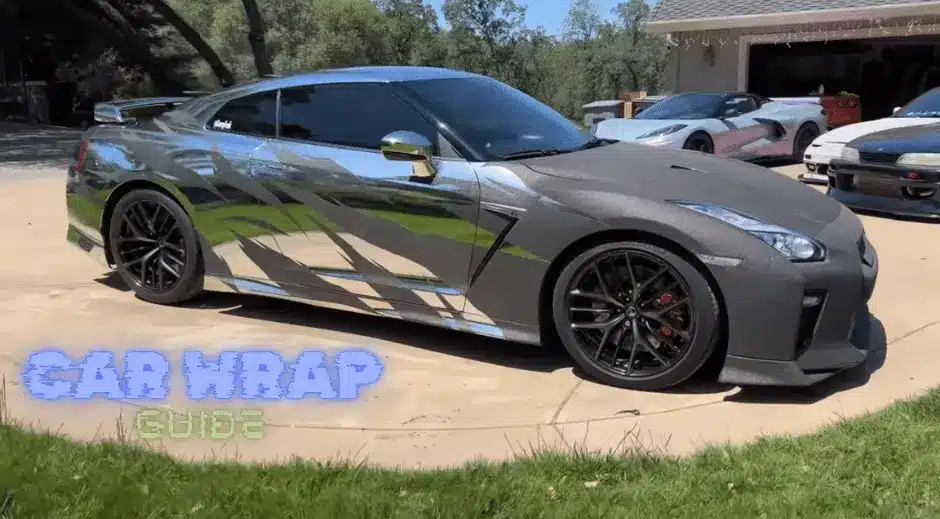Car wrapping has become a popular trend in the 21st century. It’s a fascinating process that involves applying a printed adhesive vinyl to a vehicle’s painted surface. This can give your ride a new look—whether you’re aiming for something classic and subtle or loud and eye-catching. It offers an amazing opportunity to express your personal style. A car wrap is a vinyl film that is applied over the paint of your vehicle. This film can be used to change the color, finish, or texture of the car, giving it a new and unique appearance.
Car wraps are essentially an incredibly strong adhesive vinyl that is applied directly to your car’s surface, completely covering the existing paintwork in a single, seamless layer. They come in a variety of different textures and finishes, including glossy, matte, and textured carbon-fiber. These wraps can be printed with various patterns, from graphics to full-color images. Some even offer a unique finish that replicates the look and feel of your vehicle’s original paintwork.
In this post, we’ll cover the basics of car wraps, the different types available, and the benefits they provide.
What is a Car Wrap?
A car wrap is a layer of vinyl that completely or partially covers a vehicle’s paint. This vinyl layer can be customized with various colors, textures, and finishes, giving your car a unique look while protecting the original paint underneath. Car wraps have become a popular trend in the automotive world for their ability to transform the look of vehicles without the need for a permanent paint job. Whether you’re looking to personalize your car, protect the original paint, or advertise your business, car wraps offer a versatile solution.
.

Types of Car Wraps
Car wraps come in various types, each offering different visual effects and benefits. Some of the most popular types include gloss, matte, satin, and textured finishes. Understanding the different types can help you choose the best option for your vehicle.
-Gloss Wraps
Gloss wraps provide a shiny, reflective finish that mimics traditional paint. They are popular for their vibrant look and are available in a wide range of colors.
-Matte Wraps
Matte wraps offer a flat, non-reflective finish that gives the car a sleek, modern look. They are perfect for those looking for a subtle yet distinctive appearance.
-Satin Wraps
Satin wraps combine the qualities of both gloss and matte finishes, providing a semi-glossy appearance that is smooth and elegant.
-Textured Wraps
Textured wraps include options like carbon fiber, brushed metal, and leather finishes. These wraps add a unique touch and can be used to highlight specific parts of the car.

A well-chosen wrap can transform your car, making it stand out with its unique design. Whether you prefer a sleek glossy look or the sophisticated feel of matte or textured carbon-fiber, there’s a wrap that suits every style. The ability to choose from a wide variety of finishes and textures allows you to express your personality and make your car truly one of a kind.
Learn more in our detailed guide on Types of Car Wraps.
Benefits of Car Wraps
Why choose a car wrap over traditional paint? Car wraps offer several advantages, including cost-effectiveness, customization options, and protection for your car’s original paint. They can be easily removed, allowing for color changes and updates without damaging the paint underneath.
1. Customization
Car wraps allow you to customize your vehicle with endless design possibilities. You can choose from various colors, patterns, and finishes to match your style.
2. Protection
Car wraps allow you to customize your vehicle with endless design possibilities. You can choose from various colors, patterns, and finishes to match your style.
A car wrap acts as a protective layer for your vehicle’s original paint. It guards against scratches, UV rays, and other environmental damage.
3. Cost-Effective
Compared to a professional paint job, car wraps are more affordable and can be applied or removed without damaging the original paint.
4. Advertising
For businesses, car wraps offer an excellent advertising opportunity. You can display your brand, logo, and contact information on your vehicle, turning it into a mobile billboard.

Car wraps also protect against minor abrasions, UV damage, and weather-related wear and tear. Discover all the reasons why a car wrap might be the perfect choice for you in our article on the Benefits of Car Wraps.
The Wrapping Process
Understanding the car wrapping process can help you better appreciate the skill and precision involved. The process begins with a thorough cleaning of the vehicle to remove dirt, grease, and contaminants that could affect adhesion. Next, the vinyl wrap is carefully measured and cut to fit each section of the vehicle. The wrap is then applied using squeegees and heat guns to ensure a smooth, bubble-free finish. Edges are trimmed, and the wrap is tucked around corners and edges to create a seamless look. Finally, the vehicle is inspected for any imperfections and the wrap is set with heat to ensure long-lasting adhesion.
1. Cleaning
The car is thoroughly cleaned to remove any dirt or contaminants.
2. Design & Measure
The design is chosen, and the vinyl is measured and cut accordingly.
3. Application
Professionals apply the vinyl, ensuring no bubbles or wrinkles.
4. Post-Heat
A heat gun is used to seal edges and ensure the vinyl adheres properly.
For a more detailed look at each step, refer to our guide on the Car Wrap Installation Process.
Cost of Car Wrapping: What to Expect
One of the most common questions about car wraps is the cost. The price of wrapping a car can vary based on the size of the vehicle, the type of wrap, and the complexity of the installation. Typically, a full car wrap can range from $1,500 to $3,500 and sometimes reach to $5,000, with additional costs for custom designs or premium materials. Partial wraps, such as roofs or hoods, can be more affordable. Get detailed information on what to expect in our article on the How Much Does It Cost to Wrap a Car.
Tools Needed To Wrap A Car
Wrapping a car is a fantastic way to change its appearance, protect the paint, and give it a unique look. Using the right tools is crucial for achieving a professional finish. Discover the essential tools needed to wrap your car like a professional. From squeegees to heat guns, visit Tools Needed To Wrap A Car guide which covers everything you need for a flawless vinyl wrap.
Personal Experience and Expertise
From my experience in the industry, I’ve seen how car wraps can significantly enhance the look of a vehicle. A client once came in with a standard black sedan and wanted something that stood out. We opted for a midnight purple wrap that not only made the car look stunning but also protected the original paint from further wear and tear.
Summary
Car wraps offer a versatile and cost-effective way to transform your vehicle, whether for personal customization or business advertising. With numerous benefits and endless customization options, it’s no wonder car enthusiasts are turning to wraps. If you’re considering a car wrap, explore our post on How to Apply a Car Wrap for a step-by-step guide.
FAQs about Car Wrap
1. What is a vinyl car wrap?
A vinyl car wrap is a thin, adhesive-backed film that can be applied to the surface of a vehicle. Available in various colors, patterns, and finishes, including matte, gloss, satin, metallic, and textured options, it provides a seamless and professional look.
2. Why do people wrap their cars?
People wrap their cars for several reasons: aesthetic enhancement, paint protection, advertising, and easy removal. Car wraps can change the color and appearance of a vehicle without committing to a permanent paint job. They also protect the vehicle from scratches, UV rays, and other environmental elements, making it a cost-effective solution for both customization and protection.
3. How much does it cost to wrap a car?
The cost of wrapping a car depends on factors such as the type and size of the vehicle, the type of wrap, and whether you choose professional installation. Generally, the cost ranges from $1,500 to $3,500. It’s advisable to get multiple estimates before making a decision.
4. How long do vinyl wraps last?
With proper maintenance, vinyl vehicle wraps can last from 4 to 6 years. Factors such as the type of finish and storage conditions can affect the lifespan of the wrap.
5. Can a vinyl wrap be removed without damaging the paint?
Yes, vinyl wraps can be removed without damaging the vehicle’s original paint if they are properly installed, maintained, and removed. This makes wraps a flexible option for vehicle customization.
6. What are the pros and cons of car wrapping?
- Pros: Car wraps offer a wide range of customization options, protect the original paint, are cost-effective compared to full paint jobs, and can be removed easily.
- Cons: They are not as durable as paint, can be challenging to apply DIY, and may require replacement if damaged. Additionally, poorly applied wraps can lead to rust if moisture gets underneath
For a more detailed, refer to our research on the Pros and Cons of Car Wrapping
7. How do I maintain a vinyl car wrap?
Maintaining a vinyl car wrap involves regular cleaning with mild soap, avoiding harsh chemical cleaners, and protecting the vehicle from prolonged sun exposure. Hand washing is preferred, and applying a protective polish can enhance the wrap’s longevity.
8. Can you wrap a car with dents?
Yes, you can wrap a car with dents. While wrapping can hide minor dents and scratches, it won’t fix them. Proper surface preparation is crucial for the best results.
9. What are the different types of car wraps?
The main types of car wraps include gloss, matte, satin, and textured finishes such as carbon fiber and brushed metal. Each type offers a different aesthetic and level of protection.
Check out our guide on The Ultimate Vinyl Wrap Guide if you want to Transform Your Car Like a Pro!

